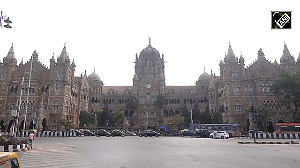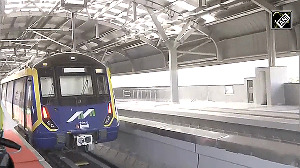This could be the budget traveller's dream: a cool, air-conditioned room with a refrigerator and a 17 flat-screen television. Tea- and coffee-makers at the bedside and an in-house gym to ensure that guests don't get out of shape on those long business trips. The cost: a startlingly low Rs 900.
Indian Hotels Company (IHC), the 100-year-old Tata Group hotel chain is attempting to rewrite the rules of the hotel business.
Last week, it whipped off the veil from its ambitious new mid-market project and opened a 100-room budget hotel in Whitefield, on the outskirts of Bangalore. The spanking new hotel which cost Rs 10 crore is already reporting 80 per cent occupancy rates even though advertising hasn't started yet.
But that's only the opening move of a major new diversification. The group is scouring the country for potential partners and ambitiously hopes to launch between 100 and 150 hotels in the next three to five years.
In the next 12 months itself the company plans to move at blitzkrieg speed and have between 1,200 and 1,500 new rooms at key locations like pilgrimage centres, trading towns and tourist spots. It's even looking at opening new hotels near bigger railway stations.
Says Raymond N Bickson Managing Director, Indian Hotels: There's a large market not being served by the organised sector. We aim to be present in every secondary and tertiary city in the country.
IHC isn't the first hotel chain attempting to carve out room in the budget hotels business. A few year ago Mahindra's had checked-in to the business and then checked-out after finding the going too tough.
ITC has its Fortune Hotels chain which offers accommodation at prices between Rs 1,000 and Rs 2,000.
And the Government made a brave stab at launching its Ashok Yatri Niwas hotels but found it tough to control room rates. Even IHC tried out cheaper hotels through its Gateway chain -- though experts say that these hotels were not designed to be budget properties.
But this time around Indian Hotels is thinking bigger and it has a bigger war chest than before. The company won't reveal precise investment figures but its new budget chain called indiOne could cost a whopping Rs 1,500 crore in the next three years if it decides to own all its new hotels. That figure is likely to come down as Bickson is likely to start franchising later on.
Can the Taj Group keep up the scorching pace it has outlined? Bickson and Sheila Nair, chief operating officer of Roots Corporation, the group company which is implementing the project, insist it can be done.
Hotel industry consultants, however, say it could be a formidable task.
Says Homi Aibara, of Mahajan & Aibara: Frankly, I don't know how anyone can contemplate setting up 150 hotel projects in four years time in India. But yes, there are definite economies that will arise and work in their favour if they manage to do that.
So why is the Taj group going down market? And does the foray into budget hotels represent a fundamental shift in the group's strategy?
The lure of budget hotels is, of course, obvious. There's a huge market out there waiting to be tapped. Bickson points out that one company alone, Hindustan Lever, has 5,000 salespersons on the road at any given point of time.
Then, there are 20 million people who travel by train annually and another 10 million in buses. If a tiny fraction of these people walk through the doors of the new hotel chain it won't have any problem about occupancy rates.
But there's also another angle to the move downmarket. The Tatas want to ensure their dominance in the Indian market. That's important now that big international names with more financial clout and global reach like the Four Seasons, Marriott and Hilton are aggressively looking for a share of the action in India.
Says Bickson: "With international competition becoming tougher in India it is essential that we increase our market share and maintain our dominance in the domestic market."
Simply stated, the group expects to double the rooms -- from 8,200 to over 16,000 -- in the next three to five years. Those numbers will come mainly from indiOne's expansion.
Bickson won't say how much indiOne will contribute to the group's revenue. But he does give one hint: currently, over 75 per cent of the group's revenues come from the luxury segment. He reckons this will drop to 50 per cent in the next three to five years
Also, the Taj group harbours global ambitions and hopes that its low-cost model can be replicated in other parts of the developing world like Africa, China and neighbouring countries
Says Nair: "What we are creating is an unique Asian model which can be replicated in other markets like south east Asia, Africa and other Asian markets . It will ensure our global dominance in this category."
Most importantly, IHC is convinced that it can make money -- and quickly. Bickson and his team reckon that, with an occupancy rate of 50 per cent, the company can break even in the fourth year. One advantage in budget hotels is that occupancy rates are less cyclical than luxury hotels.
But it has taken over two years of gruelling cheese-paring before IHC arrived at its low-cost formula. Nair says they started by trying to tweak the formula used in existing hotels, stripping down facilities and cutting costs to the bone. But they couldn't bring prices below Rs 2,500, which was too high for a budget hotel.
That didn't deter them. The chain roped in management guru C K Prahlad and then reversed gear -- they calculated how much customers were ready to pay. The mathematics and consensus was in favour of Rs 1,000 (one tenth of a five star deluxe hotel). The next step was to work backwards and control costs. Says Nair: Instead of going top-down we started the project business plan with a clean piece of paper where the key was tight financial control.
So how has indiOne kept costs under control? First it created a module: the hotels would be on 1 acre of land with 100 rooms. If each hotel costs about Rs 10 crore (Rs 100 million) that comes to around Rs 10 lakh (Rs 1 million) a room.
That compares favourably with deluxe hotels and five stars where per room cost ranges from Rs 50 lakh (Rs 5 million) to Rs 1.5 crore (Rs 15 million). And of course, by scaling up it could dramatically reduce investment in each hotel.
Then, room sizes were fixed at around 200 metres compared to five stars where they are between 250 to 400 metres. Also, it was crucial to keep staff numbers down.
For instance the entire Bangalore hotel will be run by 25 people. By comparison most five star hotels have about 250 people for every 100 rooms. Inevitably, that means slashing some services like, for instance, a room porter. Also, the company is working on automatic check-in kiosks.
IHC is also turning to technology to save on marketing and sales. For instance, it's offering Rs 50 off on Internet bookings.
Nair says that in Bangalore 70 per cent of the bookings are currently coming on the Internet. Says Nair: Sales and marketing constitute 10 per cent to 15 per cent of room cost which you save if booking through the Net becomes popular.
But will the gamble work? IHC competitors aren't talking on record but say that the model is a recipe for disaster. Other hotels industry experts are sceptical. Says hotel consultant Uttam Dave: "It is a tricky business because land costs in most cities are very high unless you move to the outskirts (like they have done in Bangalore)."
Dave points out others have started ambitiously and then failed. For instance Mahindra & Mahindra moved to the city outskirts but couldn't make the model work. Similarly, in Delhi there was the Government-owned Ashok Yatri Nivas started in the '80s with a room tariff of Rs 15 a night. That climbed to over Rs 1,500 before the hotel was sold.
Others say that the Indian Hotels' assumptions on cost savings are way off the mark.
Says a senior executive in a competing hotel chain: "On average budget hotels abroad have a room-to-staff ratio of 100 to 55. Some have lower ratios but in those markets you can outsource services like laundry and housekeeping, which you cannot in India."
Other hotel chains say they've also attempted to foray into the budget sector but have been beaten back by high land costs.
Says a senior executive of a deluxe chain: "In 1994 we looked at setting up a two- or three-star hotel, but the costing came to around Rs 13 lakh (Rs 1.3 million) a room even though we had bought the land much earlier. So we decided it was better to go in for a five star as the returns would be much better."
Indian Hotels executives say they could have charged more than Rs 1,000 in places like Bangalore but they were keen to hone their skills and ensure that the model was right.
Says Aibara: "I don't know how long the Rs 1,000 commitment will last. If a location can command a higher price based on demand then it would be tempting to charge a higher price as well."
But that's not worrying the IHC top brass. They aren't saying where the next indiOne will open. Nevertheless, they are looking at innovative ways to keep control on costs and earnings. They are even considering co-branding with companies that want to promote products in the hotel.
Nair says that they have tied up with group company Tata Tea to install coffee-makers. Also, IHC is looking at other ways to cut fixed costs. So, for instance, televisions could be picked up on a rental or on a lease agreement rather than being bought upfront.
No doubt IHC has waded into an uncharted area -- where there's still no successful magic model . The question is whether indiOne will change that scepticism.
A multi-pronged fightback
What should a desi hotel company do when it is challenged on home turf by the world's top hospitality giants? Indian Hotels has been struggling with this question ever since companies like Four Seasons and Marriott began looking over India with an acquisitive eye.
But IHC isn't about to wave the white flag even if it must soon face powerful enemies. It's looking at a bold two-pronged strategy that involves consolidating its position in the Indian market and also putting up its signboard in carefully selected foreign markets.
Certainly, this won't be an easy game. At an international level, the Taj group must establish beachheads in 'international gateways' like London, New York and Singapore (talks are on the acquire a hotel in the US and a second one in London).
Then, there are neighbouring countries where it must strengthen its position like Sri Lanka and Mauritius. Finally, it must aim for Middle East countries like Dubai, Doha and Qatar (it is looking at acquisition or management contract in these markets) where its name is well known.
If all this isn't enough, Bickson reckons the company must be present in the constantly growing 'red-hot' destinations like Shanghai and Beijing. To make these global dreams come true, IHC has put together a giant $150 million war chest.
Locally, the hotel chain has other innovative strategies to ensure that the guests and customes keep coming through its doors. For instance, the group already has over 30 spas in various hotels and it's looking at ways to turn these into bigger profit centres.
In the first phase it has set up a spa division and is building three huge new spas ranging from 10,000 sq ft to 22,000 sq ft in locations like Mauritius and Mumbai within existing properties. The investment tag: Rs 5 crore (Rs 50 million) to Rs 10 crore for each one.
Then, its about to set up service apartments in existing properties (the first one is coming up in Mumbai with 80 apartments). And for people who want adventure it is also working on revamping exisiting properties into safari parks in collaboration with a foreign company.
The logic is simple. One, it results in better utilisation of the land that it already owns in existing properties. Two, Bickson says it also helps to stabilise cylical earnings.
For instance, hotels in Rajasthan have peak occupancy in September- March. By offering safaris and weekend packages the group hopes to attract guests throughout the year. Throwing in a spa could help re-position the hotels and make them more attractive for leisure tourists.
Similarly, service apartments are an idea whose time has come in India. It could even result in global opportunities because developers in countries like China and Thailand are looking for operators to run their apartments. Service apartments have become big business for groups like the Four Seasons and Carlton.
But can these ambitious strategies help the Taj to combat the international big boys? Says a senior hotel consultant: I think they pride themselves on their management ability. But they will find it difficult to get management contracts against giants which have a large chain reach globally and distribution prowess. Unless they acquire a big hotel chain like they took over Tetley.
One rival is critical of IHC. Their strategy seems diffused. Earlier they sold hotels abroad. Now they want to buy. But this time the group faces a tougher fight and it can't afford to get its strategies and tactics wrong.






 © 2025
© 2025